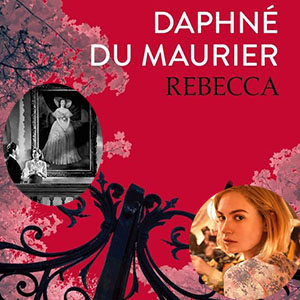This is a Gothic story, and that calls for italics. I will not offer further argument on this matter.
Journey to Manderley, a gorgeous mansion on the coast of the English sea (allegedly South England, in Cornwall). This sprawling estate was the home of the de Winter family, owned most recently by Maxim de Winter and his charming, beautiful, and above all captivating wife, Rebecca. That is, until tragedy struck, leaving Rebecca dead, a society mourning, and an air of darkness. When Maxim de Winter returns from a holiday with a new bride, she will be faced with her biggest test: can she survive Rebecca’s legacy?
Rebecca is a 1938 Gothic novel, written by Daphne du Maurier. It has never gone out of print since its first publishing in 1938, and has been the source material for multiple film, television, and theatre adaptations. Today, I discuss the source material, the 1940 Hitchcock adaptation, and the 2020 Netflix film. Be warned: darkness and terror (read: spoilers) lie ahead of you.
Rebecca (1938)
I read this book through both standard print and (mostly) Audible. This made for a level of gravitas coming through in spades with every description. Because I find verbosity in descriptions often time consuming, and don’t very much keep my attention, some of the important nuances of the story were missed; nothing too important, but enough that when watching the movies I thought to myself, “I don’t really remember that.” Again, that is with reference to descriptions of setting, not plot points.
The original novel keeps you on your seat, and I found that the drama came through the most in the original source text. As well, the novel gives each characters a bit more depth. Because the novel is told from Mrs. de Winter’s perspective (Maxim’s new wife, who goes unnamed in the story, though I decided to give her the name “Jane” in my head, and I’ll refer to her as such in the rest of this discussion), we get to feel her fear, her shame, her embarrassment, and her anger more clearly than how the films depict her. The novel also describes Beatrice, her sister-in-law, as more passive-aggressive, and even condescending, as opposed to the films, in which Beatrice is depicted as of a higher status, but still well-meaning.
While the films and the novel have the same ending (Manderley burns to the ground), they are interpreted in different ways. The novel ends with just the shock of Maxim and Jane returning to Manderley by car, seeing the orange flames in the distance. The films, however, give a bit more depth, and finality, to the story.
Rebecca (1940)
This adaptation stars Laurence Olivier, Joan Fontaine, and Judith Anderson as Maxim, Jane and Mrs. Danvers, respectfully. With it being a visual medium, you do see more. You see the beauty of Monaco, where Jane and Maxim first meet. Monaco was one of the first stops on my honeymoon, so I know a thing or two about being in love in one of, if not the most, luxurious places on Earth. I said it when reflecting on the trip, and I’ll say it again here: the greatest view I’ve ever seen is the hills of Monaco/Southern France, from across the water on a ship, late at night. I’ll touch on this again when discussing the Netflix adaptation, but that view gets its due in black-in-white, which was the medium for Hitchcock’s interpretation.
Jane is described as an orphan, with no social standing, world experience, and essentially unremarkable. Joan Fontaine is an excellent choice for this, as she looks rather plain when compared to other actresses of her time, in this film. You could easily buy her as a ladies companion with no career nor romantic prospects, until her fateful trip to Monaco with Mrs. Van Hopper, where she meets Maxim. She has no knowledge of modern society, Manderley, and certainly not Maxim, played by Laurence Olivier, who perfectly captures Maxim’s cold, distancing demeanor. I think it was more suited for the time, but when reading the book and watching this movie I kept asking myself “If it were me… Maxim only makes his interest in me known by spending time with me and talking to me. There’s no warmth, he seems almost annoyed when I make conversation… what are we doing here?” I’m guessing that Jane has that same feeling, because Joan clearly depicts Jane’s fear towards stepping into the role left by Rebecca as lady of Manderley.
It’s here that I should discuss Mrs. Danvers, who is the head of Manderley. She came with Rebecca to Manderley, having been her carer since childhood, and stayed after her untimely death. In each version, she is utterly unimpressed with Jane, making no effort to make her feel welcome in what was Rebecca’s home. Judith Anderson is completely cold to Jane, to Mr. de Winter, and only barely shows signs of warmth when referring to Rebecca: her employer, spiritual daughter, best friend, and, depending on your thoughts on queer coding, something more than friend.
Once we get to the finale of the film, in which Maxim is cleared of criminal charges for Rebecca’s death and he and Jane return to a burning Manderley, the story changes. In the novel, we are only told that after the verdict comes through for Maxim, Mrs. Danvers packs her things and quickly leaves Manderley (with Jane, when narrating the story, wondering to herself where Mrs. Danvers may be now). In this film, we see Jane and Maxim leap from their car, and sprinting to help the staff get to safety. The final moments of the film are of Mrs. Danvers, walking quietly through Rebecca’s old room, clearly the source of the fire. The staff, and the de Winters, watch as Mrs. Danvers burns alive, joining Rebecca, and Manderley, in death. A bleak ending, to be sure, and one that is doubled down and softened in the Netflix adaptation.
Rebecca (2o2o)
Having a modern visual medium, with color, adds another layer of depth to the story. We can truly see the beauty of Monaco: the green gardens, vast cliffsides, and peaceful blue sea. We can also feel the coldness of Manderley: the dreary rain, the violent cliffs, and the unforgiving, dark sea. This movie is the prettiest version of the film, in more ways than one.
Jane, as stated above, is supposed to be this quiet, mousy, forgettable lady, with no life experience. That’s why I find casting Lily James as a bold choice. Lily James does a lovely job in this role. While Joan certainly captures the fear of Jane, Lily really brings Jane’s insecurity out, as well as her near overnight growth to assertive and strong when Maxim is taken in for Rebecca’s death. However, this is the one time that I think beauty may not work in Lily James’ favor. I don’t know how else to say it: I don’t buy Lily James as being unforgettable. She is beautiful and effortlessly charming. She literally played Cinderella. That’s not someone I can believe as being anything other than graceful and captivating. Maybe if we had actually seen Rebecca through flashbacks, to juxtapose the two, there may have been more for Lily to play with (like Natalie Portman and Mila Kunis being clear opposites in “Black Swan”), but here, we only have the word that Jane’s beauty is nothing compared to Rebecca’s.
On a related note, Maxim de Winter is played by Armie Hammer. Armie Hammer has been in the news lately for accusations of sexual misconduct (along with sensationalized text messages being leaked about a potential cannibalistic fetish). With that in mind, I will say this about his role in the film: Armie Hammer is the perfect choice for someone like de Winter. He is handsome, charming, and actually brings a warmth to the character that isn’t present in the original film nor the source material. However, Armie Hammer truly brings out Maxim’s rage. Let’s leave it at that.
Kristin Scott Thomas plays Mrs. Danvers. The screenwriter for this adaptation made the choice to REALLY run with the queer coding of Mrs. Danvers. Granted, it could be that there’s no Hays Code saying “No Gays Allowed Here” anymore, but this version of “Rebecca” makes it very clear: she loved Rebecca, in every possible way. She laughed with Rebecca at the delusional love of all the men who came her way. To Mrs. Danvers, Rebecca cared about none of the men in her life, but insisted that Mrs. Danvers brush her hair every day before bed. Kristin Scott Thomas is given a great deal to work with in this adaptation: there is a montage in which she appears to warm to Jane, laughing with her when planning the Manderley Ball and offering her smiles and encouragement. This warmth is added to the film and doesn’t exist in the book, nor the Hitchcock version. Kristin Scott Thomas also gets a chance to say farewell… unlike Hitchcock’s and du Maurier’s Mrs. Danvers.
In the final moments of the Netflix adaptation of “Rebecca,” Jane and Maxim return to Manderley as it burns. As they drive home, we see Mrs. Danvers lighting Rebecca’s room, and the entire house, on fire. However, when the de Winters return, she is no longer in the house as the flames swallow it whole. She has made her way down to the seashore, incinerating Rebecca’s cottage (where she used to carry on affairs with multiple men), and stands on the edge of a cliff, preparing to jump into the same sea where Rebecca met her demise. Jane follows her, begging her not to jump. Mrs. Danvers turns to her and says that while Jane and Maxim may love each other, it will never be enough. She will never be happy. Jane tells her she’s wrong, and Mrs. Danvers jumps to her death, reuniting with Rebecca at last.
Jane then awakens in a hotel room in Cairo, as she and Maxim travel the world to find their new home. She is now confident, happy, and as she stares the camera down as she and Maxim engage in a passionate embrace: as alluring as Rebecca.
Aaron asked me which version of the story I liked more. I felt that the novel gave more depth to the characters; the Hitchcock film gave more depth to the story; the Netflix adaptation gave more depth to the setting and tone. I don’t know if I truly have a favorite version. I will say this: the novel gives a bleak finality to the story. Manderley is gone. The Hitchcock version gives the finality a grim, but less gritty, finality: Manderley is gone, but so is Mrs. Danvers. The Netflix adaptation gives the finality a gruesome ending, but with a bit more hope: Manderley, and Mrs. Danvers are gone, and now the de Winter love story can truly live happily ever after. As of now, I like the Hitchcock ending the most. The evil is gone, but the question remains: where do we go from here? The open-endedness is exactly where most of us lie. As quarantine ends, and a new administration begins on the world stage… what comes next?

